Anpassungsfähigkeit und Resilienz des Finanzsystems
Diese Forschungsgruppe untersucht kritische Aspekte der Anpassungsfähigkeit und Widerstandsfähigkeit von Finanzsystemen. Sie analysiert die Auswirkungen von Naturkatastrophen auf Finanzsysteme, die Auswirkungen politischer Präferenzen für die grüne Transformation und die Bedeutung von Kultur in den Volkswirtschaften.
Forschungscluster
Finanzresilienz und RegulierungIhr Kontakt

- Abteilung Finanzmärkte
PROJEKTE
08.2022 ‐ 07.2025
OVERHANG: Schuldenüberhang und grüne Investitionen – die Rolle von Banken für den klimafreundlichen Umgang mit emissionsintensiven Anlagenvermögen
Bundesministerium für Bildung und Forschung (BMBF)
Ziel von OVERHANG ist es, die Rolle von Banken für den klimafreundlichen Umgang mit emissionsintensiven Anlagevermögen zu untersuchen. Hierdurch sollen politikrelevante Erkenntnisse zu Finanzregulierung, staatlich kontrollierter Kreditvergabe und Finanzstabilität identifiziert sowie eine Sensibilisierung der verschuldeten Akteurinnen und Akteuren erreicht werden.
Das Projekt wird vom Bundesministerium für Bildung und Forschung (BMBF) finanziert.
01.2015 ‐ 12.2019
Interactions between Bank-specific Risk and Macroeconomic Performance
Deutsche Forschungsgemeinschaft (DFG)
07.2016 ‐ 12.2018
Relationship Lenders and Unorthodox Monetary Policy: Investment, Employment, and Resource Reallocation Effects
Leibniz-Gemeinschaft
We combine a number of unique and proprietary data sources to measure the impact of relationship lenders and unconventional monetary policy during and after the European sovereign debt crisis on the real economy. Establishing systematic links between different research data centers (Forschungsdatenzentren, FDZ) and central banks with detailed micro-level information on both financial and real activity is the stand-alone proposition of our proposal. The main objective is to permit the identification of causal effects, or their absence, regarding which policies were conducive to mitigate financial shocks and stimulate real economic activities, such as employment, investment, or the closure of plants.
Referierte Publikationen
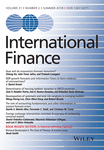
Do Better Capitalized Banks Lend Less? Long-run Panel Evidence from Germany
in: International Finance, Nr. 1, 2014
Abstract
Higher capital features prominently in proposals for regulatory reform. But how does increased bank capital affect business loans? The real costs of increased bank capital in terms of reduced loans are widely believed to be substantial. But the negative real-sector implications need not be severe. In this paper, we take a long-run perspective by analysing the link between the capitalization of the banking sector and bank loans using panel cointegration models. We study the evolution of the German economy for the past 44 years. Higher bank capital tends to be associated with higher business loan volume, and we find no evidence for a negative effect. This result holds both for pooled regressions as well as for the individual banking groups in Germany.

An Empirical Analysis of Legal Insider Trading in The Netherlands
in: De Economist, Nr. 1, 2014
Abstract
In this paper, we employ a registry of legal insider trading for Dutch listed firms to investigate the information content of trades by corporate insiders. Using a standard event-study methodology, we examine short-term stock price behavior around trades. We find that purchases are followed by economically large abnormal returns. This result is strongest for purchases by top executives and for small market capitalization firms, which is consistent with the hypothesis that legal insider trading is an important channel through which information flows to the market. We analyze also the impact of the implementation of the Market Abuse Directive (European Union Directive 2003/6/EC), which strengthens the existing regulation in the Netherlands. We show that the new regulation reduced the information content of sales by top executives.

Discussion of De Haas and Van Lelyveld
in: Journal of Money, Credit and Banking, s1 2014
Publikation lesen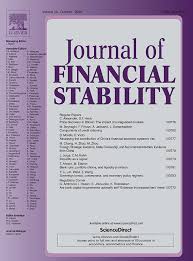
Is More Finance Better? Disentangling Intermediation and Size Effects of Financial Systems
in: Journal of Financial Stability, 2014
Abstract
Financial systems all over the world have grown dramatically over recent decades. But is more finance necessarily better? And what concept of financial system – a focus on its size, including both intermediation and other auxiliary “non-intermediation” activities, or a focus on traditional intermediation activity – is relevant for its impact on real sector outcomes? This paper assesses the relationship between the size of the financial system and intermediation, on the one hand, and GDP per capita growth and growth volatility, on the other hand. Based on a sample of 77 countries for the period 1980–2007, we find that intermediation activities increase growth and reduce volatility in the long run. An expansion of the financial sectors along other dimensions has no long-run effect on real sector outcomes. Over shorter time horizons a large financial sector stimulates growth at the cost of higher volatility in high-income countries. Intermediation activities stabilize the economy in the medium run especially in low-income countries. As this is an initial exploration of the link between financial system indicators and growth and volatility, we focus on OLS regressions, leaving issues of endogeneity and omitted variable biases for future research.
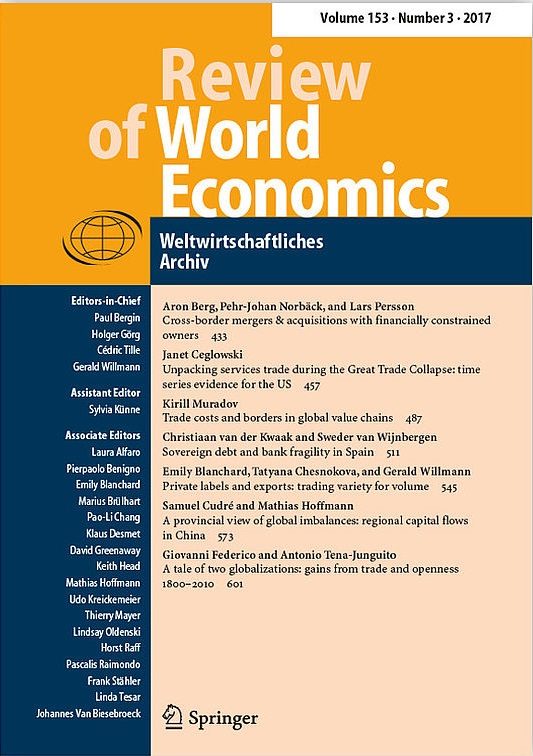
Financial Constraints and Foreign Direct Investment: Firm-level Evidence
in: Review of World Economics, Nr. 2, 2014
Abstract
Low productivity is an important barrier to the cross-border expansion of firms. But firms may also need external finance to shoulder the costs of entering foreign markets. We develop a model of multinational firms facing real and financial barriers to foreign direct investment (FDI), and we analyze their impact on the FDI decision. Theoretically, we show that financial constraints can affect highly productive firms more than firms with low productivity because the former are more likely to expand abroad. We provide empirical evidence based on a detailed dataset of German domestic and multinational firms which contains information on parent-level financial constraints as well as on the location the foreign affiliates. We find that financial factors constrain firms’ foreign investment decisions, an effect felt in particular by firms most likely to consider investing abroad. The locational information in our dataset allows exploiting cross-country differences in contract enforcement. Consistent with theory, we find that poor contract enforcement in the host country has a negative impact on FDI decisions.
Arbeitspapiere
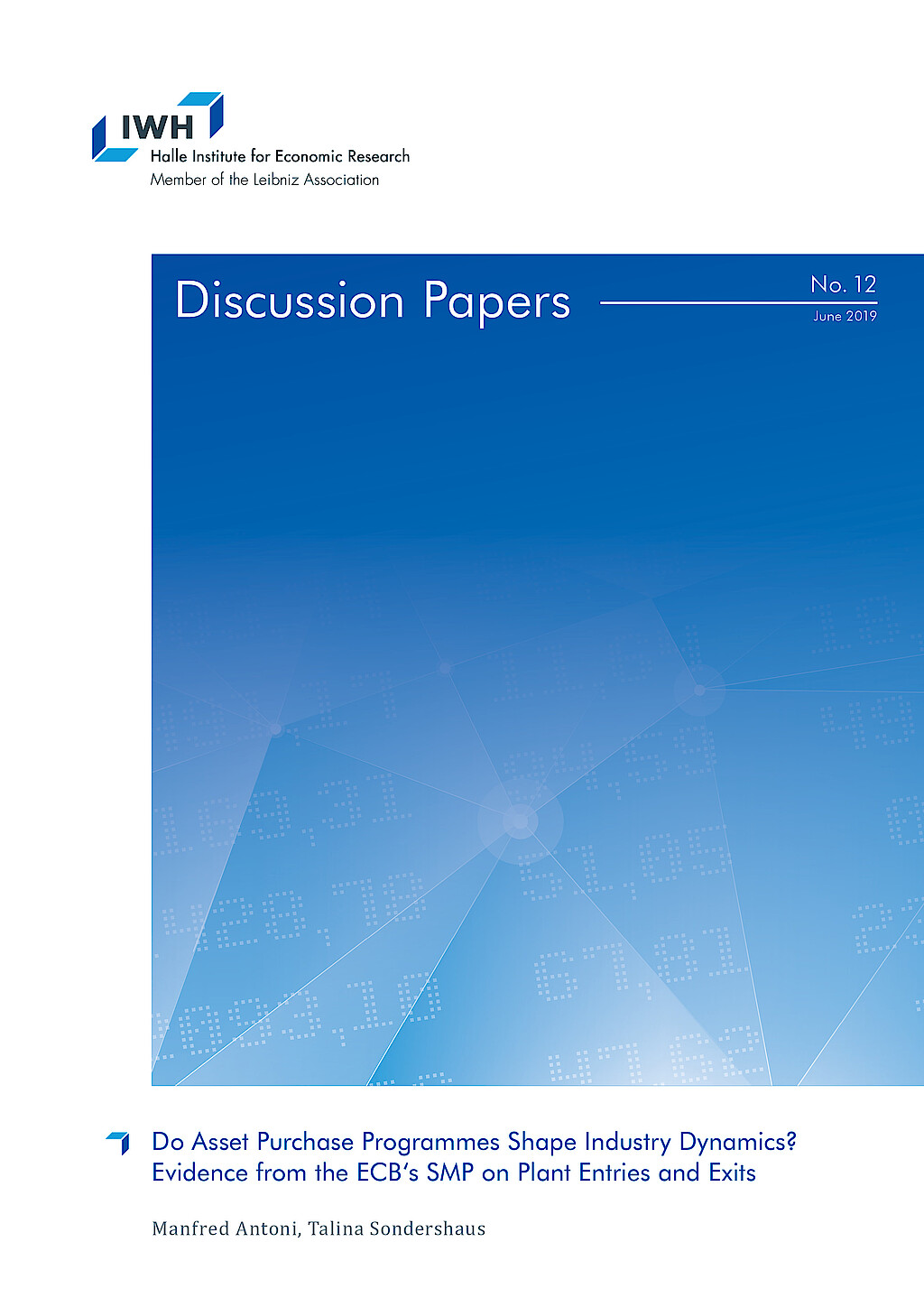
Do Asset Purchase Programmes Shape Industry Dynamics? Evidence from the ECB's SMP on Plant Entries and Exits
in: IWH Discussion Papers, Nr. 12, 2019
Abstract
Asset purchase programmes (APPs) may insulate banks from having to terminate relationships with unproductive customers. Using administrative plant and bank data, we test whether APPs impinge on industry dynamics in terms of plant entry and exit. Plants in Germany connected to banks with access to an APP are approximately 20% less likely to exit. In particular, unproductive plants connected to weak banks with APP access are less likely to close. Aggregate entry and exit rates in regional markets with high APP exposures are also lower. Thus, APPs seem to subdue Schumpeterian cleansing mechanisms, which may hamper factor reallocation and aggregate productivity growth.

‘And Forgive Us Our Debts’: Do Christian Moralities Influence Over-indebtedness of Individuals?
in: IWH Discussion Papers, Nr. 8, 2019
Abstract
This paper analyses whether Christian moralities and rules formed differently by Catholics and Protestants impact the likelihood of households to become overindebted. We find that over-indebtedness is lower in regions in which Catholics outweigh Protestants, indicating that Catholics‘ forgiveness culture and a stricter enforcement of rules by Protestants serve as explanations for our results. Our results provide evidence that religion affects the financial situations of individuals and show that even 500 years after the split between Catholics and Protestants, the differences in the mind-sets of both denominations play an important role for situations of severe financial conditions.
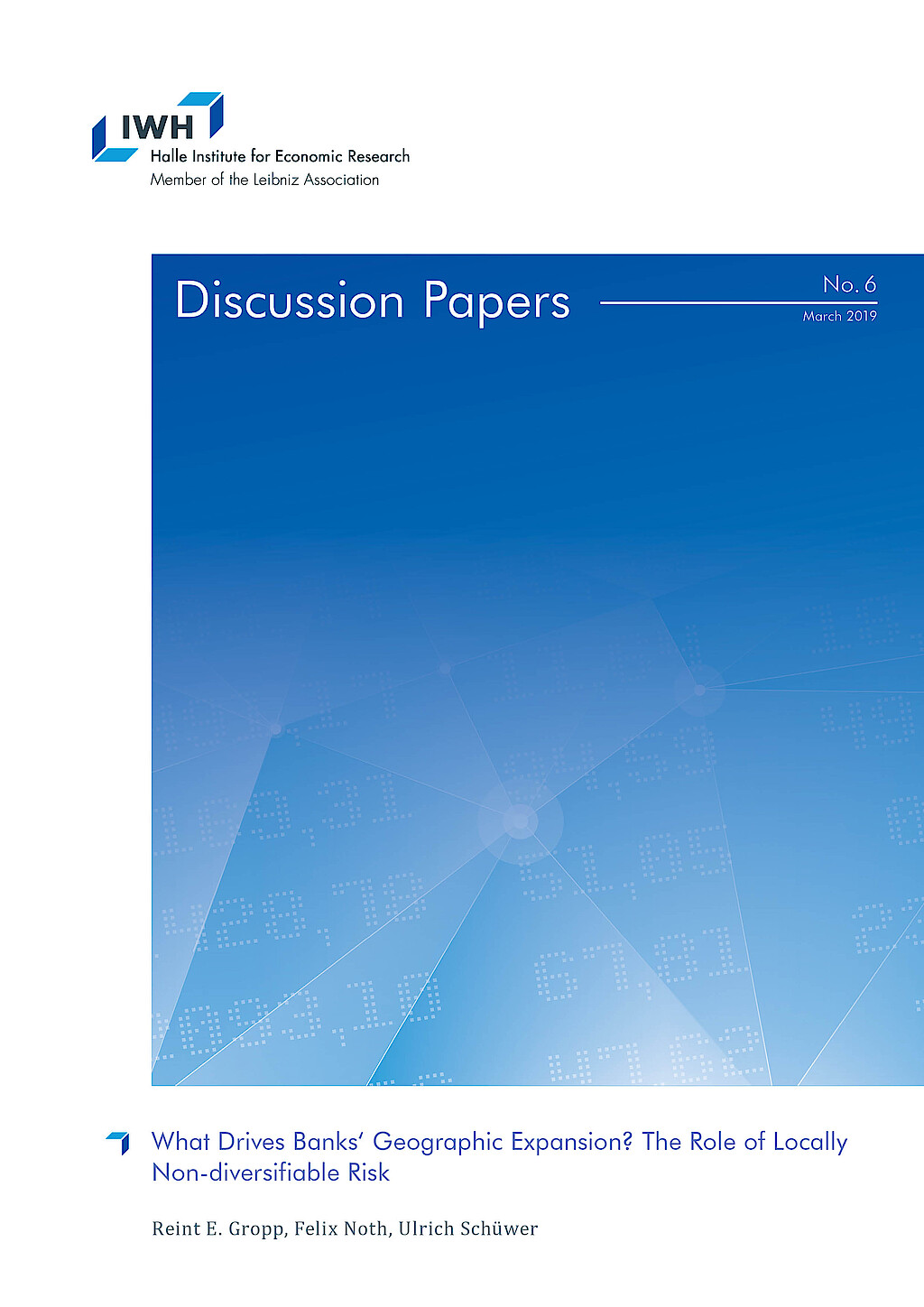
What Drives Banks‘ Geographic Expansion? The Role of Locally Non-diversifiable Risk
in: IWH Discussion Papers, Nr. 6, 2019
Abstract
We show that banks that are facing relatively high locally non-diversifiable risks in their home region expand more across states than banks that do not face such risks following branching deregulation in the 1990s and 2000s. These banks with high locally non-diversifiable risks also benefit relatively more from deregulation in terms of higher bank stability. Further, these banks expand more into counties where risks are relatively high and positively correlated with risks in their home region, suggesting that they do not only diversify but also build on their expertise in local risks when they expand into new regions.

Politics, Banks, and Sub-sovereign Debt: Unholy Trinity or Divine Coincidence?
in: Deutsche Bundesbank Discussion Paper, Nr. 53, 2018
Abstract
We exploit election-driven turnover in State and local governments in Germany to study how banks adjust their securities portfolios in response to the loss of political connections. We find that local savings banks, which are owned by their host county and supervised by local politicians, increase significantly their holdings of home-State sovereign bonds when the local government and the State government are dominated by different political parties. Banks' holdings of other securities, like federal bonds, bonds issued by other States, or stocks, are not affected by election outcomes. We argue that banks use sub-sovereign bond purchases to gain access to politically distant government authorities.
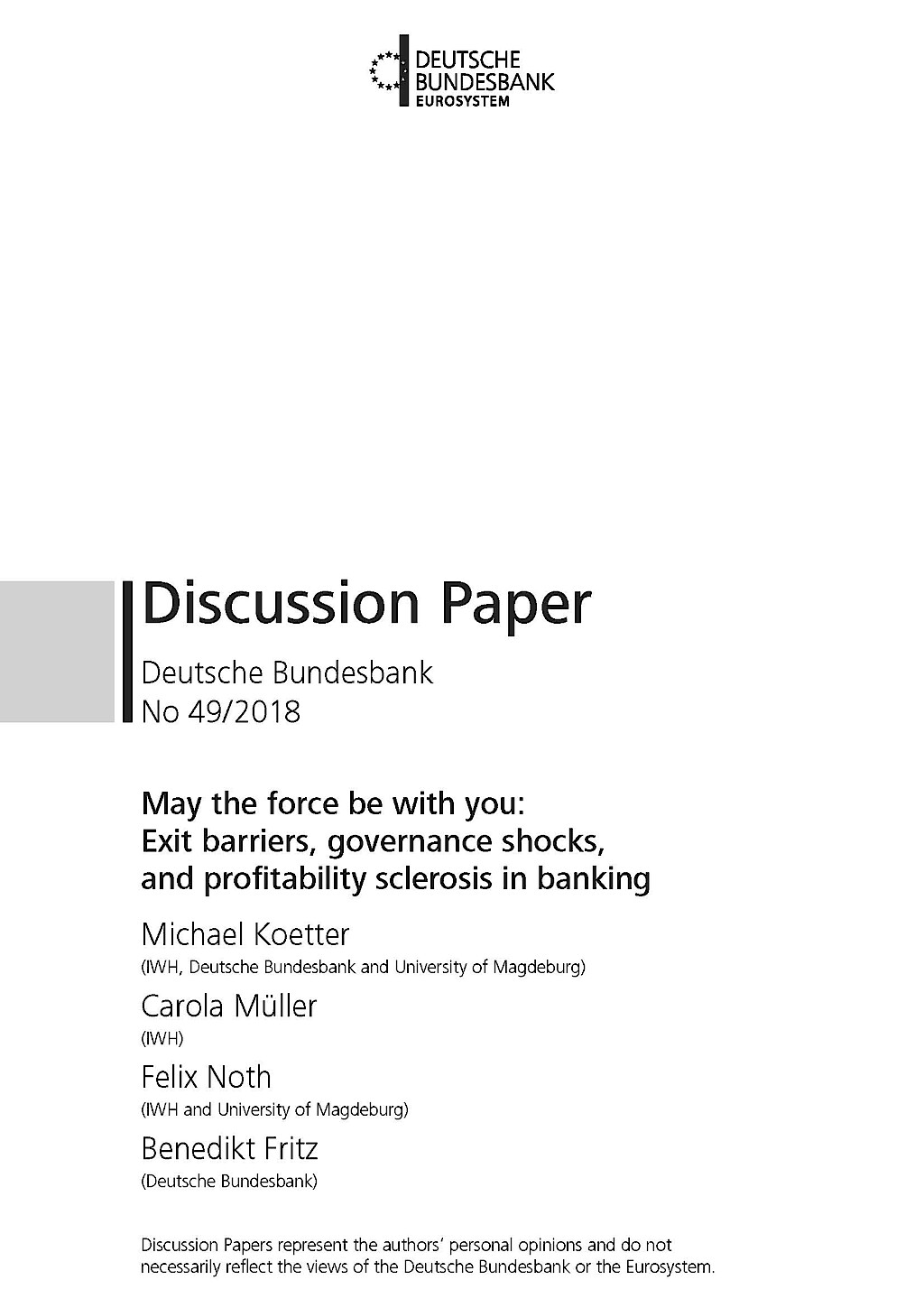
May the Force Be with You: Exit Barriers, Governance Shocks, and Profitability Sclerosis in Banking
in: Deutsche Bundesbank Discussion Paper, Nr. 49, 2018
Abstract
We test whether limited market discipline imposes exit barriers and poor profitability in banking. We exploit an exogenous shock to the governance of government-owned banks: the unification of counties. County mergers lead to enforced government-owned bank mergers. We compare forced to voluntary bank exits and show that the former cause better bank profitability and efficiency at the expense of riskier financial profiles. Regarding real effects, firms exposed to forced bank mergers borrow more at lower cost, increase investment, and exhibit higher employment. Thus, reduced exit frictions in banking seem to unleash the economic potential of both banks and firms.



















